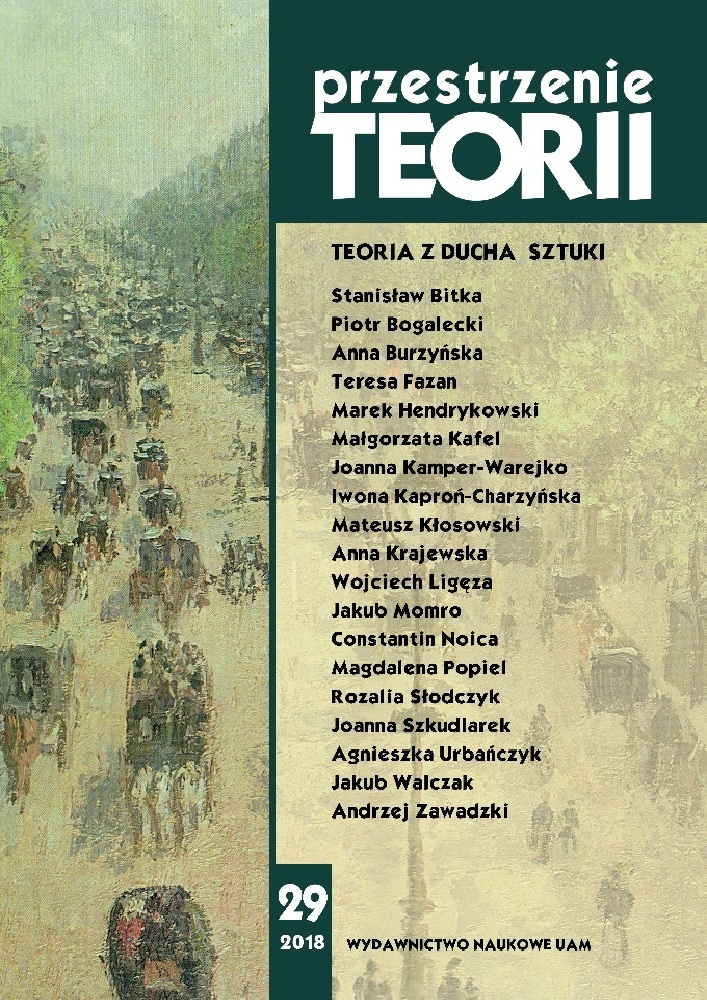Abstrakt
Though the area of fan studies has been a prolific field of research for almost three decades, it is still marginal in Poland. The purpose of this paper is not to present types of fan activity, but to discuss the way they are researched and how this research was influenced by ethnography, Pierre Bourdieu’s Critical Theory and cultural studies (especially reception studies). The classic works of fan studies have established a still dominant paradigm of the political and subversive character of fan activity, which is followed by a notion of fandom as a heterotopia. In order to continue the research, it has been necessary for academics to establish a position of involvement instead of distance and to create ethical guidelines preventing fans from being colonized as the Other. However, that may cause petrification of fan studies.Bibliografia
Bacon-Smith C., Enterprising Women: Television Fandom and the Creation of Popular Myth, Philadelphia 1992.
Bourdieu P., Dystynkcja. Społeczna krytyka władzy sądzenia, przeł. P. Biłos, Warszawa 2005.
Bury R., Cyberspaces of Their Own: Female Fandoms Online, New York 2005.
Busse K., Hellekson K., Identity, ethics, and fan privacy, [w:] Fan Culture: Theory/Practice, eds. K. Larsen, L. Zubernis, Newcastle 2012, s. 38–56.
Evans A., Stasi M., Desperately seeking methods: new directions in fan studies research,
“Participations: Journal of Audience & Reception Studies” 2014, vol. 11 (2), s. 4–23.
Fiske J., Cultural studies and the culture of everyday life, [w:] Cultural Studies, eds. L. Grossberg,
C. Nelson, P.A. Treichler, London 1992, s. 154–173.
Fiske J., Kulturowa ekonomia fandomu, przeł. M. Filiciak, „Kultura Popularna” 2008, nr 3(21), s.17–29.
Foucault M., Inne przestrzenie, przeł. A. Rejniak-Majewska, „Teksty Drugie” 2005, nr 6, s.117–125.
Gąsowska L., Fan fiction. Nowe formy opowieści, Kraków 2015.
Gindon G., Subversion, [w:] The Encyclopedia of Literary and Cultural Theory, ed. M. Ryan, Oxford 2011, s. 867–869.
Hall S., Kodowanie i dekodowanie, przeł. W. Lipnik, I. Siwiński, „Przekazy i Opinie” 1987, nr 47–48 (1–2), s. 58–72.
Jenkins H., Textual Poachers: Television Fans and Participatory Culture, New York 1992.
Jenkins H., The Wow Climax: Tracing the Emotional Impact of Popular Culture, New York 2006.
Jenkins H., Who the &% Is Henry Jenkins?, http://henryjenkins.org/aboutmehtml/ [dostęp: 4.07.2017].
Kelley B., Toward a goodwill ethics of online research methods, “Transformative Works and Cultures” 2016, vol. 22, http://journal.transformativeworks.org/index.php/twc/article/view/891/666 [dostęp: 5.07.2017].
Kobus A., Fandom. Fanowskie modele odbioru, Toruń 2018.
Larsen K., Zubernis L., Fandom At The Crossroads: Celebration, Shame and Fan/Producer Relationships, Cambridge 2012.
Lewis L.A. (ed.), The Adoring Audience: Fan Culture and Popular Media, London 1992.
Lisowska-Magdziarz M., Fandom dla początkujących. Część I: Społeczność i wiedza, Kraków 2017.
Nowakowski A., Fanzin SF. Artyści, wydawcy, fandom, Poznań 2017.
Siuda P., Fanfiction – przejaw medialnych fandomów, [w:] Człowiek a media. Obserwacje – wizje – obawy, red. W. Gruszczyński, A. Hebda, Warszawa 2007, s. 143–157.
Williams R., The Long Revolution, London 1961.
Źródła internetowe
https://www.fanfiction.net/ [dostęp: 5.07.2017].
http://archiveofourown.org/ [dostęp: 5.07.2017].
Licencja
Autorzy
Autorzy tekstów przyjętych do publikacji w czasopiśmie „Przestrzeniach Teorii” są zobowiązani do wypełnienia, podpisania i odesłania na adres redakcji umowy o udzielenie nieodpłatnej licencji do utworów, z zobowiązaniem do udzielania sublicencji CC.
Zgodnie z umową, autorzy tekstów opublikowanych w czasopiśmie „Przestrzeniach Teorii” udzielają Uniwersytetowi im. Adama Mickiewicza w Poznaniu niewyłącznej i nieodpłatnej licencji oraz zezwalą na użycie sublicencji Creative Commons Attribution-NonCommercial-NoDerivatives 4.0 International (CC BY-NC-ND 4.0).
Autorzy zachowują prawa do dalszego, swobodnego rozporządzania utworem.
Autorzy, którzy wykorzystują w swoim tekście cudze utwory (np. ilustracje, fotografie) proszeni są o dostarczenie do redakcji czasopisma zgodę na publikację od uprawnionych podmiotów.
Użytkownicy
Zainteresowani użytkownicy internetu uprawnieni są do korzystania z utworów opublikowanych po 2015 roku „Przestrzeniach Teorii” tylko w calach niekomercyjnych, pod następującymi warunkami:
- uznanie autorstwa - obowiązek podania wraz z rozpowszechnionym utworem, informacji, o autorstwie, tytule, źródle (odnośniki do oryginalnego utworu, DOI) oraz samej licencji;
- bez tworzenia utworów zależnych - utwór musi być zachowany w oryginalnej postaci, nie można bez zgody twórcy rozpowszechniać np. tłumaczeń, opracowań.
Do wszystkich tekstów opublikowanych przed 2015 r. prawa autorskie są zastrzeżone.
Inne
Uniwersytet im. Adama Mickiewicza w Poznaniu zachowuje prawo do czasopisma jako całości (układ, forma graficzna, tytuł, projekt okładki, logo itp.).
